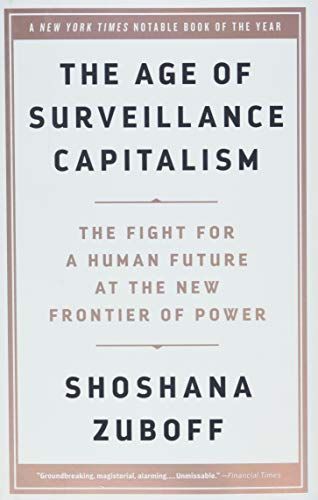
The Age of Surveillance Capitalism The Fight for a Human Future at the New Frontier of Power
The challenges to humanity posed by the digital future, the first detailed examination of the unprecedented form of power called "surveillance capitalism," and the quest by powerful corporations to predict and control our behavior. In this masterwork of original thinking and research, Shoshana Zuboff provides startling insights into the phenomenon that she has named surveillance capitalism. The stakes could not be higher: a global architecture of behavior modification threatens human nature in the twenty-first century just as industrial capitalism disfigured the natural world in the twentieth. Zuboff vividly brings to life the consequences as surveillance capitalism advances from Silicon Valley into every economic sector. Vast wealth and power are accumulated in ominous new "behavioral futures markets," where predictions about our behavior are bought and sold, and the production of goods and services is subordinated to a new "means of behavioral modification." The threat has shifted from a totalitarian Big Brother state to a ubiquitous digital architecture: a "Big Other" operating in the interests of surveillance capital. Here is the crucible of an unprecedented form of power marked by extreme concentrations of knowledge and free from democratic oversight. Zuboff's comprehensive and moving analysis lays bare the threats to twenty-first century society: a controlled "hive" of total connection that seduces with promises of total certainty for maximum profit--at the expense of democracy, freedom, and our human future. With little resistance from law or society, surveillance capitalism is on the verge of dominating the social order and shaping the digital future--if we let it.
Reviews
Pierre@pst
0xADADA@0xadada
Mark Stenberg @markstenberg3
Jimmy Cerone@jrcii
Ivaylo Durmonski@durmonski
Tao Oat@tao
Bryan Alexander@bryanalexander
Rupert Dannreuther@toberead
Louisa@louisasbookclub
Daniel Bower@danielbower
Niels Andersen@nielsandersen
Lindy@lindyb
Jeff Borton@loakkar
Sam@givemenothing
Shreya Rai @shreyoo
Taya Reznichenko@phillimore
Shibashankar Sahoo@shibhash
Zack Apira@vatthikorn
MG@marilink
Ankush Swarnakar@ankushswar1
Garrett Jansen@frailtyy
Kait Long@kaitlong
Alexandra@afswinton
Sergio Opalé@sergioopale
Highlights
Fred Rocha@johnfisherman
Ivy Chen@ivavay
Ivy Chen@ivavay
Ivy Chen@ivavay
Eneko Uruñuela@eurunuela
Page 38
Eneko Uruñuela@eurunuela
Page 39
Eneko Uruñuela@eurunuela
Page 39
Eneko Uruñuela@eurunuela
Page 42
Eneko Uruñuela@eurunuela
Page 43
Eneko Uruñuela@eurunuela
Page 70
Eneko Uruñuela@eurunuela
Page 71
Eneko Uruñuela@eurunuela
Page 74
Eneko Uruñuela@eurunuela
Page 84
Tao Oat@tao
Page 376
Tao Oat@tao
Page 129
Tao Oat@tao
Page 94